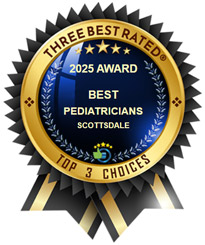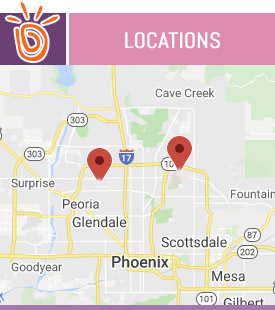Pediatric Asthma Management Q&A
While there’s no cure for asthma, symptoms can be managed and treated to protect your child’s developing lungs. At Kids Health Pediatric, we offer the experience and expertise to help safeguard your child’s overall health. Expect the highest level of care and comfort for your little one as we work towards an asthma treatment personalized to their needs. For more information, contact our team today or book online to schedule an appointment – don’t let asthma get in the way of your child living their best life. We Have 2 Pediatric Clinics in Scottsdale, AZ & Glendale, AZ.


Table of Contents:
What is the treatment and management of asthma?
What are the different types of asthma?
What are the main causes of asthma?
How can asthma be cured in childhood?
Childhood asthma can cause disruptive daily symptoms that interfere with your child’s ability to exercise, go to school, and even sleep. Unmanaged asthma can result in asthma attacks, where the lungs and airways get inflamed when they’re exposed to certain triggers (such as cold air, mold, dust, pollen, dander, etc).
Treatment and management are key components to preventing asthma attacks before they start. Comprehensive treatments mean learning to recognize what triggers your child’s asthma and taking steps to avoid those things as much as possible.
If your child has been clinically diagnosed with asthma, your pediatrician will provide you with the appropriate medication. This will include medication for long-term control, which is primarily used to reduce swelling in your airways that may lead to symptoms and quick-relief inhalers which can be used in case of an asthma attack. It’s important that you carry an inhaler with you during day-to-day activities in case of a flare-up.
Allergy medications may also be prescribed if your child’s asthma is triggered or worsened by allergies.
There are many different types of asthma, each of which is characterized by the cause and severity of symptoms. They are as follows:
● Adult-onset. With this type of asthma, symptoms start presenting after the age of 18.
● Pediatric. This type of asthma often begins before the age of 5 although it includes all patients who develop asthma before the age of 18.
● Allergic. If your asthma is brought on by exposure to allergens, such as mold, pollen, and pet dander, then you’re considered to have allergic asthma.
● Non-allergic. If your asthma is caused byoutside factors not related to allergens, such as exercise, stress, illness, or weather, then you have non-allergic asthma.
● Intermittent. This type of asthma is very sporadic and is characterized by its lack of consistency.
● Persistent. Asthma of this variety is consistent, meaning that you exhibit symptoms a good portion of the time.
● Asthma-COPD overlap syndrome (ACOS). When you have both asthma and chronic obstructive pulmonary disease (COPD), both of which make it difficult to breathe, you will be diagnosed with ACOS.
● Exercise-induced asthma. Also known asexercise-induced bronchospasm, this type of asthma is triggered by physical exertion and/or exercise.
● Occupational asthma. If you’re exposed to irritating substances because of your job, then you may have this type of asthma.
Research continues to be done about what causes pediatric asthma. While there’s currently no definitive answer on why some people get asthma while others don’t, we know that certain risk factors may make you more prone to developing it. These risk factors include:
● Having allergies
● Being exposed to harmful substances (such as toxins, fumes, smoke, etc.)
● Genetics. If your family has a history of respiratory disease, asthma, or allergic diseases, you’re more likely to develop asthma.
● Getting respiratory infections when you’re immune system is still developing
Unfortunately, just as with adult-onset asthma, childhood asthma can’t be cured. However, symptoms can be managed and treated, and, with the right treatment plan, you and your child can keep symptoms at bay and prevent damage to developing lungs.
If your child has asthma, the following can be done to help safeguard them against potential asthma attacks:
● Limit their exposure to triggers
● Don’t allow smoking around them
● Encourage them to be active
● Consult with your pediatrician when necessary
● Help them to maintain a healthy weight
● Treat acid reflux (as this can worsen asthma symptoms)
If you suspect that your child may have asthma, or are looking for more insight into what can be done to protect their health, contact the specialists at Kids Health Pediatric. Our team is friendly, experienced, and knowledgeable, and will always work with your child’s wellness and safety in mind. Contact us today for more information or book an appointment online – let us help you get your little one’s health back on track. We Have 2 Pediatric Clinics in Scottsdale, AZ & Glendale, AZ. We serve patients from Glendale AZ, Peoria AZ, Sun City AZ, Scottsdale AZ, North Scottsdale AZ, Grayhawk AZ, and surrounding areas of Phoenix AZ.

Additional Services You May Need

Additional Services You May Need









